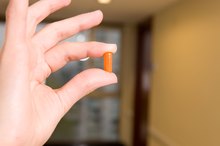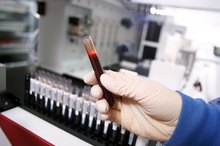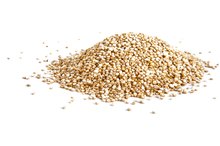Vitamin B-12 and Hemoglobin
Vitamin B12 is part of the B-complex of vitamins that are integral to many of the body’s functions. One of the most important roles of vitamin B12 is in the production of red blood cells. These cells carry oxygen throughout the body with the help of a protein called hemoglobin. A lack of vitamin B12 can cause anemia, or a decrease in the amount of red blood cells and hemoglobin in the blood stream.
Vitamin B12
Vitamin B12 is a water-soluble vitamin found in many of the foods we eat. Since it is water-soluble, the body doesn't store it in significant amounts, so a daily supply of this vitamin is necessary to preserve health. According to the National Institutes of Health, good sources of vitamin B12 includes red meats, poultry, milk, eggs, some fishes, and fortified breakfast cereals and breads. B12 is important for the normal formation of red blood cells, as well as for the health of nerves in the brain and nervous system.
Hemoglobin
Anemia & Vitamin K
Learn More
Hemoglobin is the main protein found within red blood cells. Hemoglobin's chemical composition allows it to bind oxygen coming into the lungs for transport to the body’s tissues. From there, hemoglobin binds carbon dioxide, the main waste product of the cell’s metabolism, and releases it into the lungs, so we can exhale it out of the body. When hemoglobin levels falls below a certain range, you may develop symptoms of anemia. A deficiency in vitamin B12 can affect the production of red blood cells, decreasing the number of red blood cells circulating in the blood, and therefore decreasing the amount of hemoglobin available for oxygen transport.
Symptoms
Vitamin B12 deficiency can cause macrocytic anemia. This type of anemia causes the production of fewer but larger red blood cells, decreasing the amount of hemoglobin in the blood. According to MedlinePlus, the symptoms of macrocytic anemia include weakness, paleness, diarrhea or constipation, fatigue, loss of appetite, and shortness of breath during exercise. Vitamin B12 deficiency also results in nerve damage, causing numbness and tingling of the extremities, confusion and loss of balance.
Treatment
How Much Vitamin B-12 Should I Take Daily?
Learn More
The treatment of vitamin B12 deficiency includes increasing the consumption of vitamin B12-containing foods, as well as taking B12 supplements. Absorption of dietary B12 and oral B12 supplements from the intestine requires the presence of a protein called intrinsic factor. In people who cannot produce intrinsic factor, for example those with a condition called pernicious anemia that destroys the cells in the stomach which make that protein, B12 injections are necessary to prevent deficiency. B12 injections are also necessary to treat deficiencies caused by conditions that interfere with the absorption of B12 from the intestine, such as celiac disease. The elderly also need B12 injections, since they produce less stomach acid, which is important in the absorption of B12.
Related Articles
References
Writer Bio
Ruben J. Nazario has been a medical writer and editor since 2007. His work has appeared in national print and online publications. Nazario is a graduate of the University of Louisville School of Medicine, and is board-certified in pediatrics. He also has a Master of Arts in liberal studies from Skidmore College in Saratoga Springs, N.Y.









